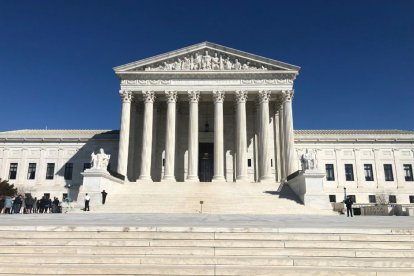Supreme Court rejects the use of race as a determining factor in college admissions
The highest judicial body in the United States ruled that both Harvard University and the University of North Carolina must treat students "based on their experiences as individuals."

(Wikimedia Commons)
The Supreme Court has ruled against affirmative action. SCOTUS said that Harvard University and the University of North Carolina (UNC) will not be able to use race for their admission process and thus benefit some of their prospective students based on this factor, even though they were still committed to following this model of student acceptance.
The Supreme Court ruled that these academic institutions violated the Constitution because they "have permitted race-based admissions only within the confines of narrow restrictions. University programs must adhere to strict neutrality; they may never use race as a stereotype or negative element."
Supreme Court Affirmative Action Opinion_Voz Media by VozMedia on Scribd
"The student must be treated based on his or her experiences as an individual—not on the basis of race. Many universities have for too long done just the opposite. And in doing so, they have concluded, wrongly, that the touchstone of an individual’s identity is not challenges bested, skills built, or lessons learned, but the color of their skin. Our constitutional history does not tolerate that choice," said Chief Justice John G. Roberts.
In the case of Harvard University, the Supreme Court ruled six in favor and two against. In the University of North Carolina case, six in favor and two against.
Citizens were clear about their position on affirmative action in universities. According to a survey Pew Research Center in June, 50% of Americans said they opposed the policy by which schools use the race of prospective students for their admission processes, clearly showing that the results and merits of each student should be used as a basis for admission. Thirty-three percent supported it.
Harvard University and North Carolina University willing to abide by Supreme's Court decision
The two universities affected by the Supreme Court's decision soon reacted to the ruling issued by the judicial body. Both educational institutions assured that they would abide by the Supreme Court's ruling but would continue to fight to maintain diversity in their institutions.
Harvard University was the first to speak on the matter and assure that they would abide by the decision. They did so in a statement sent by the school's leadership, including President Larry Bacow and President-elect Claudine Gay:
The University of North Carolina also issued a statement saying that it would respect the Supreme Court's ruling. UNC Chancellor Kevin M. Guskiewicz assured that, even with the Supreme Court’s ruling, they would continue to fight for equality:
RECOMMENDATION




















